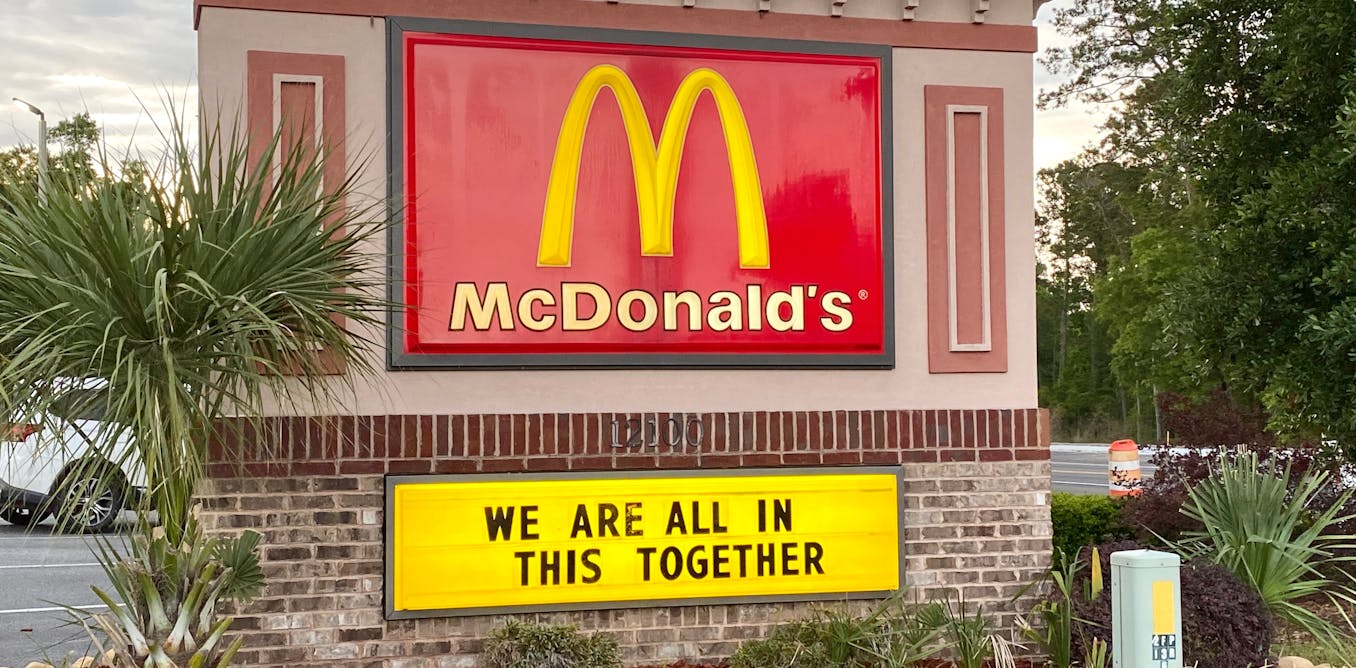At the start out of the pandemic, shoppers have been bombarded with a new and hastily manufactured type of promotion. In individuals “uncertain times”, clients have been promised, they could depend on their favourite models for aid.
The adverts, typically showcasing sombre piano audio and declarations that absolutely everyone was “in this together”, were being ubiquitous. Now our investigate reveals the ways guiding these adverts, and why shoppers must be cautious of advertising in a crisis.
When COVID was nevertheless new and bewildering, when governments have been not sure about how to react, company marketing sought to outline the pandemic in approaches that made providers – and their products – an important component of whatsoever the answer might change out to be. We identified that from mid-March to the finish of April 2020, firms utilised promotion to notify three major styles of story about COVID.
Some, like the world shipping and delivery large Maersk, emphasised the offer chain effect of the pandemic and pointed to their role aiding to get crucial products to the appropriate sites. This form of advertising described COVID as a disaster of logistics – a dilemma for which corporate supervisors could argue they have the most expert abilities.
Other individuals, specifically client goods makes like Starbucks, concentrated on the economical aspect of the condition, and their role in donating food items or dollars to individuals in unexpected need to have. This variety of marketing and advertising defined COVID as a crisis of money. If the trouble is not enough dollars, then rich businesses can swoop in as heroes by releasing some up rapidly.
Then there were those, specifically vogue and luxury manufacturers, which focused on the emotional effects of the pandemic, and pointed to their solutions as approaches to make the expertise a lot easier and even fun. These adverts built the situation that private use – procuring from your lockdown – could be a kind of humanitarian heroism, with you as the grateful recipient, or a way of using treatment of on your own.
But there had been threats hooked up to these messages, and not all of them landed very well. Some advertisements seemed oblivious to the wider social issues that were being building the crisis more durable for some to bear.
Trend ads specific at girls which described the pandemic as a sort of “staycation” for instance, sat uncomfortably following to news studies about women of all ages who had been leaving the workforce below the crushing stress of childcare and housework.
E-cigarette commercials encouraging consumers to consider up vaping “for your health” invited a backlash when hospitals were being filled with COVID patients on ventilators.
Some providers even provoked buyers by mocking the severity of the pandemic, including an Italian ski vacation resort which invited travellers to “experience the mountain with comprehensive lungs” in a area “where emotion good is contagious”. In other places, social media providers struggled to stamp out misinformation from “influencers” hired by wellness manufacturers to advertise untested products and solutions as COVID-19 cures.
Even adverts which took the pandemic significantly observed themselves on shaky ground.
When the United kingdom was coming out of its to start with lockdown, the cleaning brand name Dettol went viral (in the incorrect way) when it appeared to be encouraging commuters to return to the workplace. Some individuals conflated the adverts with govt general public company announcements promoting procuring as a way of boosting the financial state.
The false impression contained a grain of real truth, as Dettol was the government’s company partner for sanitising general public transport. In truth, many manufacturers in our investigation stated partnerships with authorities as a person of the added benefits of the disaster. In the meantime, adverts encouraging consumers to store to “help” rebuild the economy (and businesses in it) have proliferated.
Promoting which addresses social worries is typical, not just in relation to COVID, but to a variety of triggers where by people are primed to see corporate alternatives for all the things from poverty to weather change.
Consuming with a conscience?
Our exploration displays these types of promotion is regularly intended to impact how the community understands social complications, and encourages persons to think of ethical consumption as a way of helping.
As others have argued, these kinds of internet marketing related to good will cause “creates the look of giving back again, disguising the fact that it is presently based in having away”. Consumers can be deterred from campaigning for much more radical alter, believing they have currently played their section as a result of “ethical” purchasing.
Just one acquainted case in point is when providers boast that a share of proceeds from specified products goes to a social induce. The quantity donated is frequently compact when the revenue the new solution generates for the organization is sizeable.
As yet another commentator has set it: “If we insist that this is the only way to successfully deal with massive social issues, we resign ourselves to a globe dictated by buyer impulses”.
The risks then, of attaching a social difficulty to an promoting campaign, are considerable – for the business, the client, and the lead to itself. Our research indicates that not each individual time is the correct time for promoting. We really should beware of manufacturers bearing gifts.
